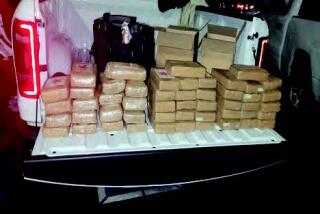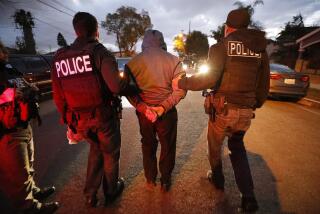12 Charged With Illegal Iraqi Transfers
- Share via
SEATTLE — Six people were arrested and six others indicted on Thursday for allegedly funneling $12 million in cash or goods to Iraq, violating sanctions dating back to the 1990 Iraqi invasion of Kuwait.
In a federal grand jury indictment, the United States alleged that 12 individuals used a Seattle-based money wire transfer company to send funds to Iraq through third countries between April 2000 and January 2002.
“Our investigation has revealed that this group that was indicted today moved roughly $28 million out of the United States over the space of about 30 months,” U.S. Customs Commissioner Robert C. Bonner told a news briefing in Washington.
“Of that amount, we have been able to trace at least $12 million of those funds or goods that ended up in Iraq via third-party intermediaries.”
Customs agents arrested Iraqi-born Hussain Alshafei in the Seattle suburb of Edmonds, Wash., and five alleged accomplices in Missouri, Virginia, Texas, Tennessee and Arizona, according to the U.S. attorney’s office for western Washington, which added there was no suggestion of terrorism in the alleged illegal money transfers.
Six additional suspects residing in Britain, Iraq, Jordan and the United Arab Emirates were also named in the indictment, which describes a vast network of people steering money to Iraq through Alshafei Family Connect Inc.
Officials declined to say whether those individuals had yet been apprehended.
A phone call to AFCI seeking comment was not immediately returned.
Customs agents in January raided AFCI, which says it helps Iraqi emigres send money home to their families, for allegedly violating the International Emergency Economic Powers Act and other restrictions on dealings with Iraq.
“This is an ongoing investigation and terrorism is not involved,” said John Hartingh, spokesman for U.S. Atty. John McKay.
U.S. sanctions imposed in 1990 prohibit direct or indirect fund transfers to Iraq.
If convicted, the suspects could be forced to pay a penalty equal to the $12 million in question and forfeit other personal property, including bank holdings.
More to Read
Sign up for Essential California
The most important California stories and recommendations in your inbox every morning.
You may occasionally receive promotional content from the Los Angeles Times.










